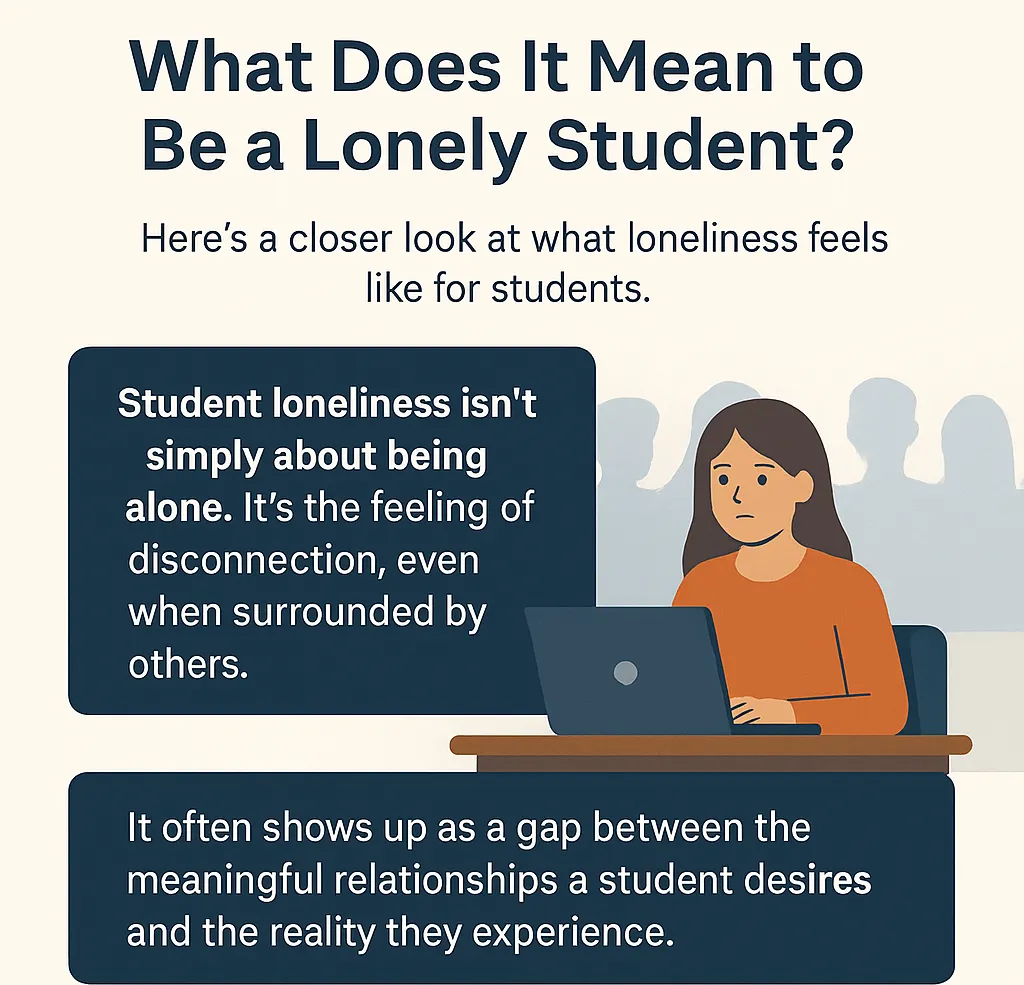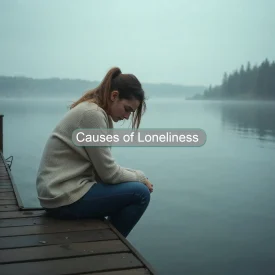Being a student can be one of the most exciting times in life, but it can also be incredibly lonely. Many students struggle with feelings of isolation—whether it’s from moving away from home, dealing with academic pressure, or trying to find their place socially.
Loneliness among students is not just a passing mood. It can affect mental health, physical well-being, and even academic performance. In fact, research shows that loneliness among young people is a growing concern. Check out our resource on loneliness facts to see the full picture.
This article explores what it means to be a lonely student, the common causes, signs to watch for, the impact of loneliness, and the strategies—both personal and institutional—that can help.
Key Takeaways
- Student loneliness is common and can affect health, mood, and academic results.
- Major triggers include moving away from home, heavy workloads, social struggles, and pressures from online life.
- Warning signs such as sadness, withdrawal, or sleep problems can show a student is struggling.
- Helpful steps include joining groups, practicing self-care, and reaching out for support.
- Colleges and universities can help by creating welcoming spaces, offering mental health services, and encouraging peer support.
What Does It Mean to Be a Lonely Student?

Here’s a closer look at what loneliness feels like for students.
Defining loneliness in the context of student life
Student loneliness isn’t simply about being alone. It’s the feeling of disconnection, even when surrounded by others. It often shows up as a gap between the meaningful relationships a student desires and the reality they experience.
When I moved away for college, I felt surrounded by new people but still disconnected. Classes were busy, the campus was crowded, but I didn’t feel like I belonged anywhere. That gap between being present and feeling truly connected is what loneliness can look like for many students.
If you have doubts about whether you are lonely, check our resource Am I Lonely? to learn more about the emotional side of loneliness.
Solitude vs Loneliness: knowing the difference
| Aspect | Solitude | Loneliness |
|---|---|---|
| Emotional Tone | Calm, peaceful | Empty, sad |
| Choice or Not | Voluntary | Unwanted |
| Impact on Health | Restorative | Stressful & harmful |
| Effect on Motivation | Boosts focus & creativity | Decreases drive & interest |
It’s important to separate loneliness from solitude. Solitude can be healthy—time alone to recharge or reflect. Loneliness, on the other hand, feels empty and isolating.
For a full breakdown, you can read Loneliness vs. Solitude.
Common Causes of Student Loneliness

Starting a new chapter as a student can bring unexpected challenges that affect how connected you feel.
- Transition to a new environment – Moving away from home, adapting to campus culture, or living in a new city can feel overwhelming. This shift can make it harder to find familiar support systems, leaving students feeling isolated.
- Academic pressure and workload – Stress and heavy study schedules often leave little time for building friendships. The constant demand to perform well can cause students to withdraw from social activities, increasing feelings of loneliness.
- Social challenges – Making new friends, fitting in, or navigating cultural differences can create feelings of isolation. When social connections don’t come easily, students may struggle to build the meaningful relationships they want.
- Digital life and social media – While online platforms offer ways to stay connected, they can also lead to comparing yourself to others or feeling left out, which might deepen loneliness rather than ease it.
- Mental health factors – Anxiety, depression, and low self-esteem can intensify loneliness. These feelings often feed on each other, making it harder to break the cycle. For more on how loneliness and mental health relate, see our article on loneliness and depression.
Signs a Student May Be Struggling with Loneliness

Recognizing these signs early can help students get the support they need before loneliness takes a deeper toll.
Emotional signs
- Persistent sadness that doesn’t seem to go away or improve over time
- Irritability or mood swings that feel intense or unpredictable
- Loss of motivation or enjoyment in activities that once felt rewarding
Behavioral signs
Behavioral signs of loneliness in students may include avoiding group activities or social gatherings, even when opportunities to connect arise.
Some students might skip classes or social events, choosing isolation over engagement. They may also gradually withdraw from friends or peers, creating increasing distance in their relationships.
Physical and health signs
- Sleep difficulties such as trouble falling asleep, staying asleep, or restless nights
- Constant fatigue that affects daily energy and concentration
- Frequent minor illnesses, which can result from a weakened immune system linked to stress and loneliness
The Impact of Loneliness on Students

Loneliness can have a significant impact on students in several ways. It can affect academic performance and motivation, making it harder to concentrate and causing a loss of drive that may lead to lower grades.
Mental health often suffers as well, with stress, anxiety, and depression becoming more intense.
Physical health risks are also a concern, since loneliness has been linked to weakened immunity, poor sleep, and other health issues.
If loneliness is left unaddressed, it can lead to long-term consequences, affecting future relationships, career confidence, and a student’s sense of identity.
Strategies to Overcome Student Loneliness

There are several practical steps students can take to reduce loneliness and build a stronger sense of connection.
- Building social connections – Join clubs, study groups, or volunteer to meet like-minded peers.
- Improving communication skills – Practice starting conversations and active listening.
- Balancing social and academic life – Use time management strategies to avoid burnout.
- Practicing self-care and mindfulness – Exercise, journaling, or hobbies can strengthen resilience.
- Seeking professional support – Reach out to campus counselors, therapists, or support hotlines.
Role of Schools and Universities in Reducing Loneliness
Schools and universities play a crucial role in reducing loneliness by creating inclusive environments. Orientation programs, peer mentoring, and welcoming events help students feel more connected and supported from the start.
Mental health support services are essential as well. Having accessible counseling centers, helplines, and workshops provides students with the tools and help they need to manage loneliness and related challenges.
Encouraging peer support networks, such as study buddies or group activities, promotes a sense of community and belonging among students.
Finally, addressing stigma is important. Schools can help normalize conversations about loneliness and mental health, making it easier for students to seek support without fear of judgment.
Technology and Digital Companionship for Lonely Students

Technology and digital companionship are becoming more common as socially assistive technologies and AI companions gain popularity. To learn more about these, see our resource, What is an AI girlfriend, which explains how AI companions can offer emotional support.
Virtual connections come with both pros and cons. While they can provide comfort and reduce feelings of loneliness, they might also encourage some to avoid face-to-face interactions, which are important for building deeper relationships.
Using technology wisely means seeing digital tools as a complement to real-life relationships, not a replacement. Platforms like AI girlfriend can help students feel more connected, but maintaining a healthy balance with in-person connections is key.
When to Seek Help
Knowing when loneliness becomes overwhelming is important. If it starts to affect daily functioning, such as disrupting sleep, concentration, or motivation, it’s a clear sign to seek help.
There are professional and community resources available to support students. Therapists, student services, and helplines offer guidance and assistance to manage loneliness and related challenges.
Supporting a friend who may be struggling also plays a vital role. Simply listening without judgment and encouraging them to reach out for help can make a meaningful difference in their well-being.
Conclusion
Feeling lonely as a student can be tough, but it doesn’t have to define your experience. By reaching out and making small changes, you can build real connections and find a sense of belonging. Asking for help takes courage, and support is always available when you need it.
Disclaimer
This article is for informational purposes only and is not a substitute for professional advice.
Frequently Asked Questions
What factors contribute to students feeling isolated during their academic journey?
Moving away, academic stress, social difficulties, social media impact, and mental health issues can all lead to student loneliness.
How can someone identify if a student is experiencing loneliness beyond just being alone?
Look for signs like ongoing sadness, withdrawing from social events, poor sleep, and loss of interest in activities.
What practical methods can students use to help reduce feelings of loneliness?
Students can join groups, practice self-care, and seek help. Schools can offer support services and create welcoming environments.





